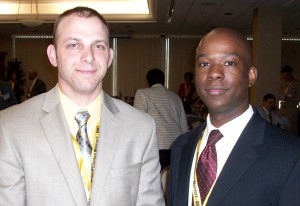By Sarah Greer, WTC Stratcom

(left to right) AW2 Veterans Wesley Spaid and Alvin Shell at the Wounded Warrior Federal Employment Conference. Shell shared his experience of working in the federal government for five years since his transition from the Army.
Editor’s Note: Earlier this week, WTC Stratcom posted more of CPT Shell’s story on the WTC blog. This post is an update on his remarks.
Yesterday, AW2 Veteran Alvin Shell spoke at the Wounded Warrior Federal Employment Conference, sharing his success story of working at the Department of Homeland Security (DHS) for the last five years.
He was accompanied by his wife, Chilketha, and he was surprised to see his platoon sergeant, retired SSG Wesley Spaid—a surprise guest from Shell’s AW2 Advocate Yan Barry. Shell was injured in Iraq while trying to extinguish Spaid’s fire, resulting in third degree burns on more than 30% of both their bodies. They had not connected since 2006.
Alvin Shell was injured in 2004, sustaining severe burns to more than 33% of his body, in addition to several other injuries, such as post-traumatic stress disorder, traumatic brain injury, chronic pain, and muscle loss. When he received his medical retirement from the Army, he also received a 100% disability rating from the Department of Veterans Affairs.
He told the conference attendees why finding employment post medical retirement was so important to him, “When my wife was feeding me and taking care of me right after my injury, I told myself that if I ever made it out of the bed I’d make sure she’d never have to work again.”
So he went to work as a law enforcement officer at DHS, one of the first wounded Veterans from the current conflicts to join the DHS staff. “If you come to my branch at DHS, I’m tough, I’m hard, but I’m fair. I don’t expect less from others than I do of myself.”
Now, Shell holds a supervisory position, serving as the Acting Deputy Division Chief in the Force Protection Branch in the Office of the Chief Security Officer. While the Department offered him every physical accommodation he could think of, it took some time for Shell’s supervisors to understand his abilities, in spite of his injuries. He learned that they were withholding his name from nomination for a class that could significantly enhance his career.
“They thought they were protecting me, helping me avoid a difficult situation where I couldn’t meet the physical requirements of the class,” said Shell. “Instead, they were holding me back. When I found out, I went to my supervisor and we talked about the specific physical requirements of the class, and he realized that I could do it.”
For example, the class only required you to run two miles, and Shell ran four miles a day. It also required target shooting, and Shell regularly shot from a further distance than the test required. Shell completed the class and graduated “top gun.”
“My supervisor and I both learned that we should have a conversation about my abilities, rather than focus on my disabilities,” he said.
Shell also opened up to the crowd and shared how much his priorities had changed since his injury. I was particularly struck when he told them that he’d always been a great Soldier, always getting top ranks in every course. However, he stated that after his injury, he realized he’d been putting his career above his Family. “Now, I have a good balance,” he said. “Now, I make sure to make my wife and sons a top priority, to go on vacation and to the boys’ sporting events. Even if it means that I only get a few hours of sleep at night, this is the stuff that matters.”
Editor’s Note: Are you an employer from the federal government or private sector interested in hiring a wounded warrior? E-mail AW2CareerProgram@conus.army.mil to connect with an AW2 Career Coordinator.

